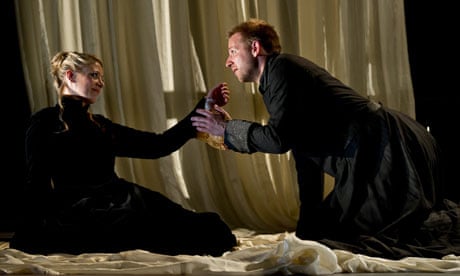Premiered at the Buxton festival by Music Theatre Wales ahead of an autumn tour, Salvatore Sciarrino's 1998 opera The Killing Flower is the first of his operas to be performed in the UK, and though it might not be to all tastes, its appearance is somewhat overdue.
Better known in Italian as Luci Mie Traditrici (my treacherous eyes) – The Killing Flower is Sciarrino's own title for the English version. The piece derives from a 17th-century play loosely based on the life of Carlo Gesualdo, the aristocrat composer, notorious for murdering his wife and her lover. Sciarrino's treatment is typically muted and tense. Musical gestures are sparse and quiet, and the pervasive mood is at once erotic and threatening. The vocal lines inhabit declamatory territory between song and speech, though there are moments of tangled Monteverdian lyricism when the Duke becomes suspicious of his wife's infidelity, and the Duchess and the Guest who becomes her lover recognise and then express their uncontrollable desire for each other.
Michael McCarthy's period production wisely avoids excessive interpretative interference, but nicely captures the gathering sense of unease and uncertainty through chiaroscuro effects, sudden flashes of light and unexpected plunges into darkness.
The dominant performance comes, as it should, from George Humphreys's Duke, wonderfully convincing as the handsome sensualist whose passions gradually coalesce into obsession. He's in superb command of Sciarrino's elusive style, too. Amanda Forbes, more conventionally operatic, is his wayward Duchess, meltingly beautiful in her duet with William Towers's enraptured Guest. It's finely conducted by Michael Rafferty, too. The balance occasionally comes adrift, however, and the piece itself might, I suspect, be more suited to the intimate studio spaces where it plays this autumn, than to the Buxton Opera House, with its conventional proscenium and pit.

Comments (…)
Sign in or create your Guardian account to join the discussion